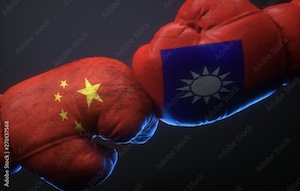The Domino Effect: What Would an Invasion of Taiwan Mean for Global Trade
By Victoria Holmes, Braumiller Law Group
Tensions are escalating in the South China Sea, a vital maritime route for international trade. Taiwan remains at the center of this conflict and in an increasingly interconnected world, the prospect of a Taiwan invasion has far-reaching implications for global trade and geopolitics. It’s becoming even more crucial to understand the potential repercussions of such an event on the global economy as a potential invasion from China becomes increasingly more likely. This article explores the multifaceted impact of a Taiwan invasion on trade, focusing on the role of the U.S. Navy, the specter of World War III, disruption in vital supply chains, and its effect on the chip manufacturing industry.
US and China’s Navy Capabilities.
Any attempt to invade Taiwan would likely involve a significant naval operation. China’s naval force isn’t as well-equipped as the United States, but it is growing its military powerhouse. According to Global Firepower’s 2023 rankings, The US Navy operates 11 carriers, compared with China’s 2, and the US Navy operates 92 destroyers compared to China’s roughly 50-destroyer strong fleet. But, China’s military powerhouse is growing. The country is expanding and upgrading its navy as part of a broader military modernization campaign. It’s building new warships, including its first domestically designed and built aircraft carrier, at least five new destroyers, and up to 400 ships in the coming years.
If China were to invade Taiwan, the US would be sure to respond. This would bring the two superpowers into an explosive confrontation. The intervention would also have immediate implications for global trade. The South China Sea is one of the busiest and most strategically important waterways in the world, with over $5 trillion in annual trade passing through its waters. The presence of U.S. Navy vessels in the region would disrupt maritime traffic and increase insurance costs, leading to delays and potentially pushing up prices for goods around the world.
The Specter of World War III
A clash between two of the world’s biggest superpowers is sure to escalate to a global conflict. With modern technology and an economy even tightly intertwined more than ever, the two World Wars of the 20th century would look like child’s play. The international community has a vested interest in avoiding such a scenario due to the catastrophic consequences of another world war. An all-out war involving major powers could result in the collapse of international trade as we know it.
Disruption in Vital Supply Chains
Taiwan is a linchpin in global supply chains, especially in the tech industry. The island nation is home to some of the world’s leading semiconductor manufacturers, including TSMC (Taiwan Semiconductor Manufacturing Company). TSMC’s clients include Apple, Intel, Qualcomm, and Nvidia. Apple accounts for one fifth of the company’s revenue. A sudden interruption in the production of semiconductors and other high-tech components could have a cascading effect on industries worldwide. Car manufacturers might have to halt production due to a shortage of chips, leading to a domino effect on suppliers and dealerships. Consumer electronics, although improving its supply chain disruptions, would face further challenges, potentially driving up prices for consumers.
Chip Manufacturing Industry Consequences
In the short term, a military conflict in Taiwan would disrupt chip production and lead to shortages. This would affect not only consumer electronics but also critical infrastructure like medical devices and defense systems. Industries relying on these chips would face production delays and increased costs, potentially slowing economic growth.
In the long term, an invasion of Taiwan could lead to a reevaluation of global supply chains. Companies and nations may seek to diversify their sources of semiconductor production to reduce reliance on a single, vulnerable location. This could result in increased investment in semiconductor manufacturing facilities in other countries, potentially reshaping the industry’s landscape.
What’s Next
An invasion of Taiwan would have dire consequences for global trade and the stability of the world order. The involvement of the U.S. Navy, the risk of World War III, disruption in vital supply chains, and the impact on the chip manufacturing industry all highlight the far-reaching implications of such an event.
China considers Taiwan a part of its territory and will continue to seek control over the island nation. Talks about a potential invasion as soon as 2024 are making headlines and relations between US and China are not getting any better. It is vital to prepare now for a disruption to global supply chains as the island nation prepares to counter an attack against military aggression.

























